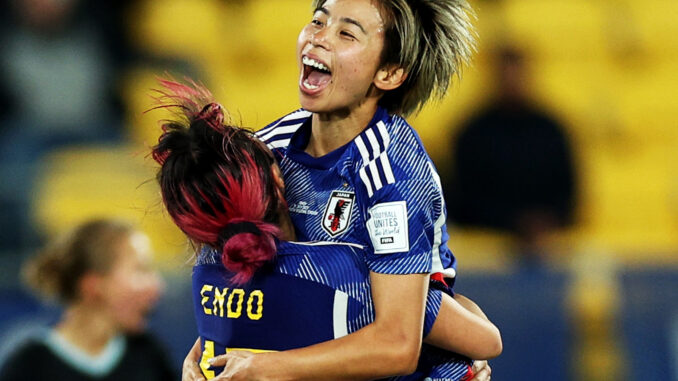

Futoshi Ikeda has run counter to the traditional principals of Nadeshiko football and executed a pragmatic game plan that serves as a fine example of how a team can control a game of football without controlling the ball.
Japan beat an elite Spanish side in an astounding 4-0 victory to finish top of Group C and set up a Round of 16 fixture with fellow former champions Norway.
Perhaps more than the impressive scoreline, it was the tactical approach taken by the Nadeshiko that is
likely to receive the most attention.
Japan are renowned for their possession-based style that cherishes intricate passing and harmonised movements. However, with Spain arguably boasting more technical quality, a fresh perspective seemed to be in order here.
The night before the match Ikeda was quizzed by Spanish journalists on his game plan and what approach the Iberians can expect from his side. The former Urawa Reds man offered an unequivocal description of his intentions:
“We will be compact against Spain’s aggressive build-up play. We will aim to win the ball back through a
systematic approach, as well as regaining possession via one-on-one encounters,” he said.
Although progression to the Round of 16 was already secured, little squad rotation was afforded by either side.
Speedy striker Riko Ueki came in for Mina Tanaka, while defensive midfielder Honoka Hayashi
replaced playmaker Yui Hasegawa.
For Spain it was Real Madrid defender Oihane Hernandez and forward Esther Gonzalez who started this
one on the bench.
Japan’s game plan was clear from the get go; they would settle into a low block with five at the back
when out of possession and seemed content in letting Spain dictate the pace of play.
Whilst this was a style unlike any seen before from the Nadeshiko, the organisation and cohesion in their defensive structure and efforts when regaining possession were highly organised and had clearly been worked on in training.
In transition the Japanese were clinical and methodical to a tee. This was realised early on when Jun
Endo sent a crisp ball from the flank around the back of the high Spanish line for Hinata Miyazawa to
latch onto.
The Mynavi Sendai forward had her pursuers beaten for pace as she bore down on goal before firing past Spanish keeper Misa Rodriguez to give Japan the lead.
Proceedings would continue along similar lines until Miyazawa would once again find a way through on
goal before setting up Tokyo Verdy Beleza forward Ueki who’s shot would take a deflection off defender
Irene Parades with the ball looping over the keeper to double Japan’s lead.
Déjà vu struck again in the 40th minute as Ueki threaded a sublime through-ball for Miyazawa to latch
onto and make it three. Ikeda’s game plan was seemingly working to perfection and there was a strong
indication that a landslide result was on the cards at this point.
Halftime came with Japan comfortably in control of the contest without controlling possession. Spain
were well and truly locked out of the danger zone and at a loss as to how they might find a way back into this game.
Ikeda would later go on to say that he felt the backline sat too deep for his liking in the first half. Coming
out of the traps for the second half Japan would step up slightly but the game would play out in a similar
fashion.
Spain came out with a little more bite and came close with an Ona Battle effort just skimming wide of
the mark. Head coach Jorge Vilda was likely to have had strong words with his side as the scoreline at
the interval might warrant.
The introduction of Miyabi Moriya for Risa Shimizu at right back saw Japan play a little more into the
flanks with the creative wing-play that proved successful in the previous two games.
As the game headed into the latter stages Spain struggled to make any progress of note and were forced into last ditch efforts such as a a long range shot from Teresa Abelleira that sailed harmlessly over the bar.
Fluid counter-attacks would still come from Japan and the game was wrapped up for all intents and
purposes.
Substitute Mina Tanaka claimed Japan’s fourth when she received a thrown in from Moriya to feet
and found herself in acres of space with freedom to advance on the Spanish penalty area. She produced
a sublime left footed finish to end all doubt of a comfortable Japan victory.
The final whistle went with the Japanese rejoicing in a thoroughly deserved win that will surely go into
the annals of Nadeshiko history.
They had executed their game plan to perfection and had made a strong statement concerning their tactical versatility. There will surely be some detractors to the defensive approach taken by Ikeda, but it is important to remember that counter-attacking football has never been in Japan’s nature and they have shown the world that they are able to take either a progressive or pragmatic approach to a frightening degree.
To play devil’s advocate one might consider the fact that Japan are yet to come up against a competent
defensive structure at this tournament. Should a team take a similar approach as they did against Spain
there is no telling how this young side might react if they are to go deep into a match without scoring.
WHAT WE LEARNED
Defending without physicality: Japan’s signature possession game is believed to be borne out of necessity given the perceived physical disadvantage they, along with other Asian nations, often face at international competitions. This contest, however, dispels the myth that Japan are a one-system team, unable to frustrate teams with a pragmatic defensive approach.
Of course, the game plan was not reliant on physicality as Japan would avoid one-on-one encounters whenever possible. Indeed it was organised movements and positional discipline that allowed the Nadeshiko to restrict the space in the final third and close in on the ball carrier. This performance may well serve as a tactical blueprint for an alternative system moving forward.
Embed from Getty ImagesComposure at last?: Applying the finishing touch often proves to be the only crucial attribute lacking for Japan at major tournaments. With 11 goals scored the 2011 champions seem to have alleviated this tendency and look much more relaxed in front of goal. All of the forwards to have started in the front three and all have found the net, with Hinata Miyazawa leading the golden boot race on four goals as it stands. No doubt the confidence is brimming within the forward ranks as a result.
WHAT THEY SAID
Hinata Miyazawa
“I was happy to be the one to score two goals but it was a team effort. A result of the defence doing its
job and providing me with the right pass at the right time is what enabled me to put the ball in the net.”
Futoshi Ikeda
“In our first two games we had more time and space to work with the ball. Against Spain we knew we
would spend more time defending so playing on the counter seemed the better approach. We were
effective in our sequences of play in transition and I am happy we executed the game plan well.”
Jorge Vilda (Spain coach)
“They closed every bit of space we had. They got to every ball before us and we saw a very powerful
block in front of us tonight.”
WHAT COMES NEXT
As winners of Group C Japan will next face Norway in the Round of 16. The game will again be held at
Wellington Regional Stadium on Saturday 5 August at 20:00 local time as Japan look to progress beyond the Round of 16 for the first time since 2015.
Listen to The Asian Game Podcast LIVE from the FIFA Women’s World Cup 2023




